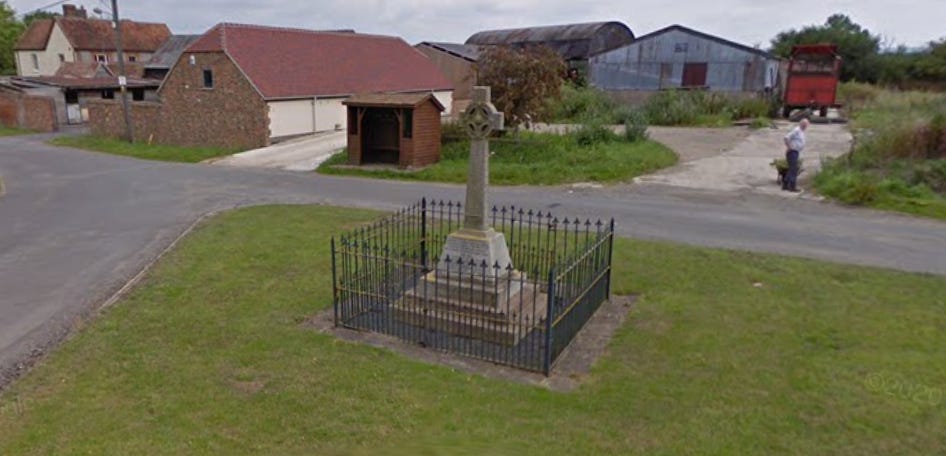Today is V-E Day, and I’m thinking about a conversation I had with my wife a few years ago, the first time she visited my parents’ house. We took a walk up to the hamlet of Moreton, a mile or so outside of town, and as we were passing through she asked me “what’s that?”, pointing to the object in the photo above. (Photo courtesy of Google StreetView.)
I found it interesting that she needed to ask, because anyone who grew up in England would know the answer instantly. But then they don’t have monuments like this all over the place where she grew up - because Brazil didn’t send two successive generations of its men off to be slaughtered in a bloodbath.
So I found myself explaining that every British town, big and small, has a memorial somewhere to the First and Second World Wars, engraved with the names of the men of that community who were killed. It’s a mundane observation, but saying it out loud made me think about it a little harder than normal. I’ve walked through Moreton a zillion times, but until then I’d never really considered the significance of this particular war memorial.
Because Moreton is tiny: it’s just a dozen or so houses scattered along a single road. Its population can’t be higher than a hundred - yet even a place as small and insignificant as Moreton lost sons and brothers in those conflicts.
And it’s not just Moreton. Every town, every village, every district of every city, every inhabited scrap of land from John O’ Groats to Land’s End has a similar monument. Every church, every school, every business, every sports ground, every scout hut, every hospital - if it existed in 1939, then somewhere on its premises is a plaque engraved with the names of the dead. That’s how many lives were lost. That’s how many communities were affected. That’s how many families were shattered.
So as these grand sweeps of history fade further into the past, let’s remind ourselves of the obvious: this was real. Real people just like you died in their millions to secure the world we enjoy today in all its glorious imperfections. Nothing we face comes close to the human cost born by our recent ancestors. Remember them.
I worry we won’t remember. You might wonder how we could possibly forget, but the truth is that we do forget most things eventually. One day there’ll be no-one left alive who remembers either war; next there’ll be no-one who’s old enough to have known someone who remembered. Things will become ever more distant and abstract and unrelatable, and the only thing left will be these monuments.
And the cemeteries.
We can’t stop the march of time; the best we can do is keep the flame of remembrance alive for the next generation and trust they’ll do the same. A good place to start would be to pay more attention to our many memorials. Every single name belonged to a real person like you. Remember that.
You never think it will happen to you. You grow up, you learn, you love, you play, you have your whole life ahead of you, and you dream of all the adventures you’ll have and the great things you’ll achieve - until one day history comes out of nowhere to erase you. Textbooks round the death toll to the nearest million, and the only trace you ever existed is a name carved into a slab of granite that most people walk by without a second glance. There goes the only life you’ll ever have.
Could anything be worth it? I don’t think so. But if I was standing there in the trenches awaiting my turn to be ripped to shreds by machine gun fire, I imagine I might take comfort in the thought that it was all for a higher purpose: that by giving up my life I was creating a better world for those who remained. And I would damn well hope that the people I left behind would live lives that were worthy of my sacrifice.
So ponder this: what kind of world is worth losing your life for? Because untold millions have been on the other side of that bargain. Have you earned it?



